
ASSAULT WEAPON: Armed Forces chief Tan Sri Zulkifeli Mohd Zin (right) shows Najib a sub-compact SCW0921 rifle from the United States after the launch of Lima 2013. At left is Defence Minister Datuk Seri Ahmad Zahid Hamidi.— Bernama photo
LANGKAWI: Prime Minister Datuk Seri Najib Tun Razak yesterday opened one of the world’s major defence shows and lamented that he had to do so under the cloud of a terrorist intrusion in Sabah.
“It was the first time troops had been deployed on Malaysian soil since 1989,” he said when opening the 12th Langkawi International Maritime and Aerospace Exhibition (Lima 2013) here.
The year 1989 saw the outlawed Communist Party of Malaya (CPM) sign a peace agreement with the Malaysian government, thus ending the communist terrorist threat in the country.
In sharing his thoughts with the delegates and military personnel from the country and abroad at Lima 2013, Najib said he had served as the defence minister, as the deputy prime minister and as the prime minister and spoken at this exhibition and others like it, but it was the first time that he had delivered such a speech while the country was facing the threat from Sulu terrorists in Sabah.
What began six weeks ago has become the biggest internal security threat since the end of the communist insurgency, he said.
He explained that the Malaysian and Philippine governments attempted to end peacefully the stand-off with the Sulu terrorists from the southern Philippines, but the initiative yielded no progress.
Malaysia then decided that the presence of the invading force was no longer tolerable and launched a military operation, he said.
The ‘Ops Daulat’ offensive against the Sulu terrorists was launched on March 5 and has resulted in 65 of the terrorists killed. The terrorists had earlier ambushed and killed eight policemen. A soldier also died in a subsequent gun battle.
“Many of you have served your nation either in the armed forces or in government. You have made big decisions about defence procurement and policy, advised companies and forces on spending and strategy.
“As a former defence minister, I have faced such decisions before about committing troops in Bosnia and Somalia and about peacekeeping operations in Lebanon,” Najib said.
He said the decisions were tough as they involved potential loss of life and deployment of national resources but “they do not adequately prepare you for a situation like that which emerged in Sabah”.
“What was a policing matter soon become a live operation with members of each of the forces committing themselves to protecting Malaysia’s sovereignty,” he said.
The prime minister expressed his appreciation to those who were serving in Sabah, using their skills and professionalism to bring an end to what he said could have become a diplomatic incident.
“I urge the men and women currently on duty in Sabah to remain steadfast and vigilant. Our prayers are with you always. There is no price higher than the sacrifices made by our security forces in fighting armed intruders,” he said.
Najib said it was the responsibility of the government to ensure that the security personnel were given the best equipment the country could afford and to show that the lives of men that the nation lost in protecting the sovereignty were not lost in vain.
On Lima 2013, Najib said military modernisation programmes continued to drive defence spending in Asean.
“Acquisition of ships and aircraft, drones and armoured vehicles will continue to be the focus of procurement within the region and is expected to form the majority of defence procurement spending till 2020.
“According to (the defence publication) Jane’s, Southeast Asian countries increased their defence spending by 13.5 per cent last year and, for the first time, Asia’s military spending is set to overtake Europe’s,” he said. — Bernama
